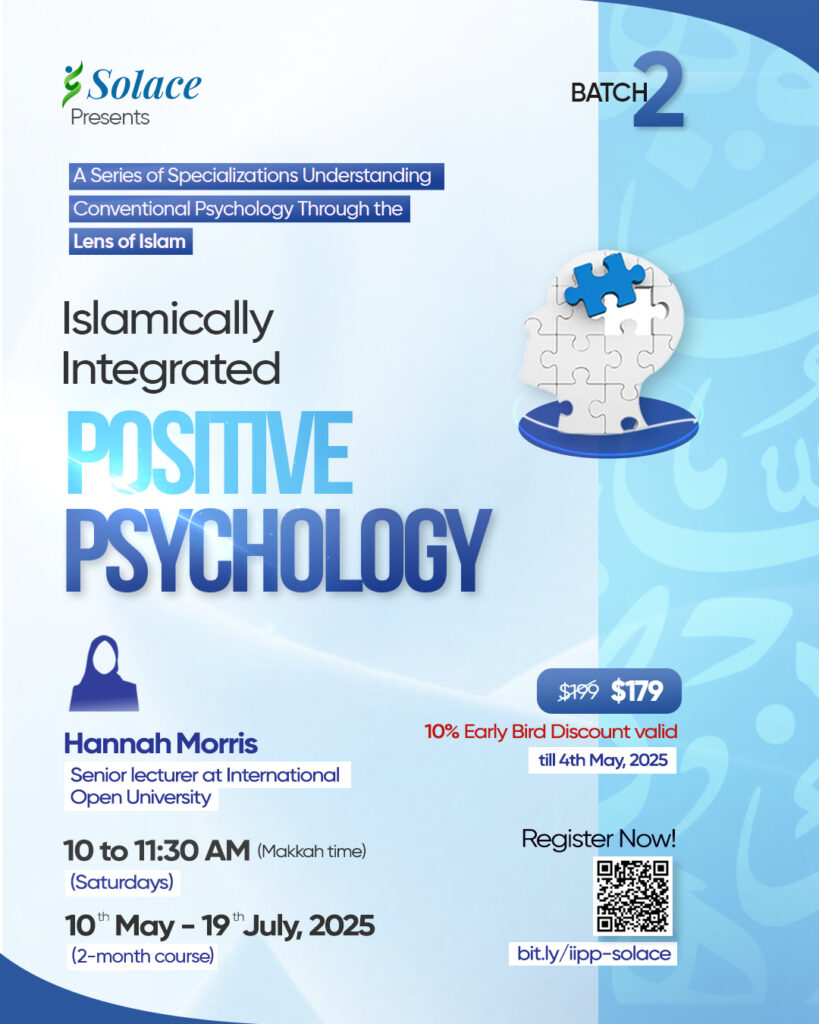Specialization Series
Islamically Integrated Positive Psychology
Introduction to Course:
Islamically integrated positive psychology is an approach towards psychological wellbeing that acknowledges current and past negative experiences whilst allowing space for positive experiences in the present and future alongside this. Using an Islamically informed approach to positive psychology, we understand and draw upon techniques grounded in the Quran and Sunnah.
Objectives of course:
– Learn and understand the underlying theory behind how and why key concepts of positive psychology work.
– Be able to identify the ways in which positive psychology concepts are rooted within the Qur’an and Sunnah.
– Understand ways positive psychology can be applied in different ways – for personal development, supporting others in counselling, coaching, or similar, and research.
– To be able to use practical skills in positive psychology by applying theory into practice.
– Completing and using interactive worksheets/journal/reflections for personal or professional use.
– Adapt positive psychology techniques to work with different client groups
– Adapting positive psychology techniques to compliment various therapeutic orientations
What to Expect:
Spiritual and Psychological Growth: Learn the foundational concepts of positive psychology paired with Islamic teachings.
Actionable Insights: Receive tools and strategies that are practically applicable and spiritually enriching.
Interactive Learning: Engage in discussions and practical activities to apply these insights effectively.
Community Building: Connect with a like-minded community interested in a faith-based approach to psychology.
This specialization is ideal for:
Individuals seeking deeper self-understanding and spiritual growth.
Psychology professionals looking to integrate faith with their therapeutic practices.
Anyone curious about how Islamic perspectives can enhance psychological well-being.

Testimonials
I would like to extend my heartfelt gratitude to our esteemed mentor, Dr. Hannah, and the entire Solace team for organizing the insightful and transformative course on Positive Islamic Psychology.
This course has truly been a game changer for me. I have gained a deeper
understanding of various psychological and spiritual techniques that not only enhanced my personal growth but will also significantly benefit my clinical practice with clients. Each reflection exercise allowed me to introspect meaningfully, helping me connect the concepts with my own life experiences and professional journey.
I’m especially grateful for the recorded sessions, which allow me to revisit key points I may have missed during the live classes-ensuring that the learning continues beyond the course itself.
Jazakum Allahu Khairan for this enriching opportunity. May Allah bless your efforts and allow many more to benefit from this valuable initiative.
I enjoyed the course focusing on the positive psychology that is embedded in our beautiful Deen.
I found this to be a wonderful course for anyone wanting to learn how the Islamic perspective of Positive Psychology can help transform them and also others. Having previously been a student of Islamic Psychology, I was keen to delve more deeply to understand how its concepts dovetailed into the positive values as conveyed by the Quran and Sunnah. I am happy to say that I learned these things and more. And this was no doubt aided by the fact that Ustazah Hannah is most knowledgeable of the subject, while doing an excellent job in clearly explaining the concepts within an interactive approach during the course.
Understanding positive psychology from the Islamic perspective was a great achievement for me because it answered so many questions that contemporary psychology couldn’t. This is a must-take course for any Muslim in the field of psychology.
The certification is truly one of a kind. The most powerful aspect of this certification was the subtle growth I witnessed in both myself and the people around me. This certification encourages the focus on enhancing the skills Allah has already placed within an individual, while striving for additional positive traits from a ‘winning’
rather than a ‘fixing’ perspective. This certification provides a fresh approach to helping individuals reach their full potential. A profound reminder like that helps us subconsciously push our boundaries.
Modules covered:
Module 1: What is positive psychology?
Module 2: Principles of Positive Islamic Psychology
Module 3: Positive Islamic Psychology model
Module 4: Positive psychology in the Qur’an and Sunnah
Module 5: Positive psychology key concepts (building resilience, hope, gratitude, optimism, flourishing, flow)
Module 6: Positive psychology techniques I (benefit finding, compassion, mindfulness)
Module 7: Positive psychology techniques II (cultivating positive emotions, broaden and build, savouring the positive, identifying character strengths)
Module 8: Positive psychology in group vs individual settings, adapting and using positive psychology techniques in different therapeutic orientations.
Module 9: Positive psychology for specific client groups (family, addiction, eating disorders, anxiety, depression)
Module 10: Current directions and the future of Islamically integrated positive psychology
Disclaimer: At Solace-Islamically Integrated Mental Health Services, we collaborate with a diverse range of instructors to deliver the courses. While Solace endorses the overall qualifications and expertise of each instructor, the integration of psychological concepts with Islamic principles, including specific interpretations and detailed religious perspectives, reflects the individual understanding of each instructor. Solace assumes no responsibility for any discrepancies or variations in the application of these principles or interpretations presented in the course material.
Certificate: A certificate of attendance will be awarded at the end of the program to participants who pass the final exam, consisting of 20 MCQs, with a minimum score of 80%
Important Note: Please note that this is a psychoeducational program and does not authorize any non-specialist to do therapy/counselling. Any such attempt by the individual is his/her own responsibility and Solace takes no responsibility for such an action.
Course duration: 2.5 months
Timings: 10:00 am to 11:30 am Makkah Time
Date: 10th May 2025 – 19th July 2025 (with a 1 week Eid break)
Every Saturdays
Investment: $199 $179
10% Early Bird Discount till the 8th May 2025.
Instructor
Hannah Morris
is originally from the UK and is working as a Senior Lecturer and Instructor at the International Open University (IOU). She has a Bachelor’s degree in Psychology, a Masters in Health Psychology and is currently completing her PhD. She has over 10 years of experience working in health and social care settings in the UK, USA and Ireland. She has primarily worked in secure psychiatric hospitals housing adults with enduring mental health problems and forensic histories, and in residential settings for children and adolescents with behavioral and emotional difficulties.

